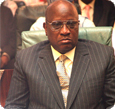Former Chief Justice of Nigeria (CJN), Justice Salihu Alfa Modibbo Belgore says corruption among public officials can only cease if the immunity clause is eliminated.
The clause protects governors from prosecution while they are in office. The former CJN says until it is expunged, public officials will continue to abuse their office and plunder the treasury.
The former CJN in an interview last Friday in Abuja said some of the governors conscious of the provision of section 308 of the constitution that serves as a cover against criminal prosecution do anything they like to the detriment of the people, stressing that the section is too wide and unnecessary.
Section 308 (a) of the 1999 constitution states that: “No civil or criminal proceedings shall be instituted or continued against a person to whom this section applies during his period of office.”
He said that it was a good step that anti-corruption agencies were established by the last administration to stem the tide of corruption; but maintained that the effort would not make much impact as long as the immunity clause is retained in the constitution.
According to the legal icon, “The kind of blanket immunity which is given to the governors cannot assist our democracy. It aids corruption. It is unfortunate that some of them are just being arrested and prosecuted now after they had left the office. “
It would be recalled that a good number of the former governors and even the serving ones are being prosecuted or investigated by the Economic and Financial Crimes Commission (EFCC), the Independent Corrupt Practices and other Related Offences Commission, the Code of Conduct Bureau and the police.
They are; the former governors of Bayelsa state, Diepreye Alamieyesegha, Abia state, Orji Uzor Kalu, Taraba state, Jolly Nyame, Benue state, George Akume, Ekiti state, Ayodele Fayose, Jigawa state Saminu Turaki, Plateau state, Joshua Dariye, Enugu state, Chimaroke Nnamani, Edo state, Lucky Igbinedon and Delta state, James Ibori, among others.
Those already before the Federal High Court in various parts of the country have nothing less than 100 counts on the charge sheet, a situation that has heightened anger among the people about how the offices were abused.
Justice Belgore who would be 71 next Thursday having retired last year at 70 said that he was not surprised that immediately some of them handed over to their respective successors, they went into hiding knowing the atrocities they had committed against the people.
Had the immunity not been put in the constitution, he argued, the situation would have been effectively under control even while they were in office, adding that sub-section(b) of section 308 even prevented their arrest.
It states: “A person to whom this section applies shall not be arrested or imprisoned during that period either in pursuance of the process of any court or otherwise; and says that “No process of any court requiring or compelling the appearance of a person to whom this section applies, shall be applied for or issued.”
Justice Belgore maintained that there is no way any serious battle could be waged against corruption if the whole section 308 is retained.
“The situation would have been handled right from inception if they were not protected by the immunity clause in the constitution. I have always argued that section 308 encourages corruption and for the purpose of sanitising the system it should be removed. “If the immunity against criminal and civil prosecution were not in the constitution, all the allegations for which they are now in court would have been curtailed. They would not have arisen at all. So it is better to take this thing off, at least for the time being. If in future, the system is stabilized to the extent that every person in government sees himself as a trustee of public treasury, amendment could be affected on the constitution to accommodate it.”
To ensure that judiciary performs its function of checking the excesses of the executive particularly at the state level, Justice Belgore said that judges must be subjected to the control of the National Judicial Council.
A situation whereby the governor removes the chief Judge at will and mostly on flimsy reasons is an abuse of section 292 of the constitution, adding that if the judiciary is not well protected, corruption would continue to rear its ugly head.
From Funso Muraina and Tochi Oputa in Abuja
This Day
Sunday, January 13, 2008




